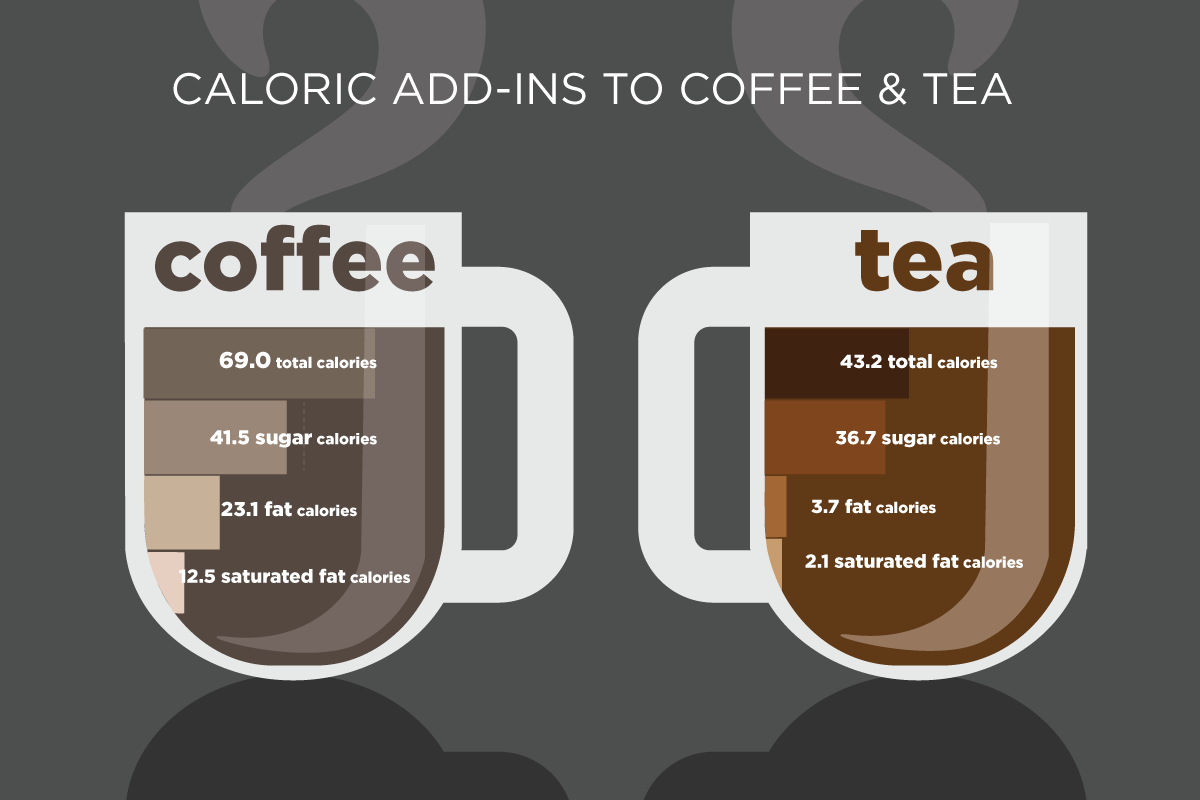Does Coffee Have Calories? Myths & Facts Unveiled

Yes, coffee has calories. Black coffee contains minimal calories, typically around 2 calories per 8-ounce cup.
Coffee is a popular beverage enjoyed worldwide. Its low-calorie content makes it an attractive choice for those mindful of their intake. However, the calorie count can increase significantly with added ingredients like sugar, cream, or flavored syrups. Black coffee, free from additives, remains nearly calorie-free.
This makes it an excellent option for dieters or those seeking to maintain their weight. Understanding the calorie content in coffee helps in making informed dietary choices. So, enjoy your coffee, but be mindful of what you add to it.
Coffee’s Caloric Content
Many wonder if coffee has calories. The answer is yes, but it depends. The caloric content varies based on how you drink it. Let’s explore the details.
Black Coffee Basics
Plain black coffee is low in calories. A standard 8-ounce cup contains about 2 calories. This calorie count is negligible. Black coffee is made by brewing ground coffee beans. No added ingredients mean fewer calories.
Additives And Their Impact
Adding ingredients increases coffee’s calorie count. Common additives include:
- Sugar: One teaspoon adds about 16 calories.
- Cream: One tablespoon adds about 52 calories.
- Milk: One tablespoon adds about 9 calories.
- Flavored Syrups: One pump adds about 20 calories.
These additives transform low-calorie coffee into a high-calorie drink. Here is a table showing the calorie increase:
| Ingredient | Calories per Serving |
|---|---|
| Sugar (1 tsp) | 16 |
| Cream (1 tbsp) | 52 |
| Milk (1 tbsp) | 9 |
| Flavored Syrup (1 pump) | 20 |
A simple cup of black coffee can become a calorie-heavy treat. Use additives sparingly to keep your coffee low in calories.
Myths About Coffee And Calories
Many believe that coffee has no calories and boosts metabolism. Are these facts or myths? Let’s uncover the truth about coffee and its calorie content.
Zero Calories Myth
Some think coffee has zero calories. This is not true. A basic cup of black coffee has about 2 calories.
Adding sugar, milk, or cream increases the calorie count. Here is a quick breakdown:
| Ingredient | Calories |
|---|---|
| Black Coffee (8 oz) | 2 |
| 1 Teaspoon of Sugar | 16 |
| 1 Tablespoon of Cream | 52 |
| 1 Cup of Whole Milk | 146 |
Metabolism Booster Claims
Some claim coffee boosts metabolism. This is partly true. Caffeine in coffee can slightly boost your metabolism.
But the effect is small. It won’t lead to significant weight loss.
Here are some facts about caffeine and metabolism:
- Caffeine can increase your metabolic rate by 3-11%.
- The effect is stronger in lean people.
- Caffeine’s effect decreases with age and regular consumption.
Understanding Coffee Add-ins
Many people enjoy coffee with add-ins. These add-ins can change the calorie count. Understanding what you put in your coffee can help you manage your diet better.
Milk And Sugar
Milk is a popular coffee add-in. Different types of milk have different calorie counts. Here is a table showing the calories in different types of milk:
| Type of Milk | Calories (per cup) |
|---|---|
| Whole Milk | 150 |
| 2% Milk | 120 |
| Skim Milk | 80 |
| Almond Milk | 30 |
Sugar adds sweetness but also calories. A single teaspoon of sugar has about 16 calories. Many people use more than one teaspoon, which adds up quickly.
Syrups And Creamers
Syrups are often flavored and add a lot of calories. Here are some popular syrup flavors and their calorie counts per tablespoon:
- Vanilla Syrup: 50 calories
- Caramel Syrup: 60 calories
- Hazelnut Syrup: 60 calories
Creamers come in many varieties. They can be flavored or plain. Here is a table showing the calories in different types of creamers:
| Type of Creamer | Calories (per tablespoon) |
|---|---|
| Plain Creamer | 20 |
| Flavored Creamer | 35 |
| Non-Dairy Creamer | 10 |
Choosing the right add-ins can help you control your calorie intake. Be mindful of what you add to your coffee.
Coffee’s Role In Weight Management
Coffee is a popular beverage enjoyed worldwide. But does it help with weight management? Many people wonder if coffee can assist in their weight loss journey. This section explores how coffee can impact appetite and energy expenditure.
Appetite Suppression
Drinking coffee might help reduce hunger. Studies show that caffeine can suppress appetite. This can lead to fewer calories consumed throughout the day. Here are some ways coffee may curb your hunger:
- Caffeine affects hormones that control hunger.
- Drinking coffee before meals can make you feel full.
- Black coffee has very few calories, making it a good choice.
Many people find that coffee helps them avoid snacking. This can be very useful for weight management. But remember, adding sugar or cream can add calories.
Energy Expenditure
Coffee can also boost your energy levels. This can help you burn more calories. Here are some ways coffee may increase energy expenditure:
- Caffeine stimulates your metabolism.
- It can increase fat burning during exercise.
- More energy can lead to more physical activity.
Regular coffee drinkers may find they have more stamina. This can make it easier to stay active and burn calories. Remember, moderation is key. Too much coffee can lead to negative effects like jitteriness or insomnia.
In summary, coffee can play a role in weight management. It can help suppress appetite and boost energy expenditure. Choose black coffee for the best results.
Nutritional Value Of Coffee
Coffee is a popular beverage enjoyed worldwide. It’s known for its rich flavor and energizing effects. But many wonder about its nutritional value. Does coffee have calories? Let’s explore the nutritional aspects of coffee.
Antioxidants And Micronutrients
Coffee is rich in antioxidants. These compounds fight free radicals in the body. Free radicals can cause damage to cells.
Studies show coffee has more antioxidants than green tea. This makes coffee a great choice for health-conscious people.
Additionally, coffee contains several micronutrients:
- Vitamin B2 (Riboflavin)
- Vitamin B3 (Niacin)
- Vitamin B5 (Pantothenic Acid)
- Manganese
- Potassium
These micronutrients support various bodily functions. They help maintain overall health and well-being.
Coffee Vs. Other Beverages
How does coffee compare to other popular beverages? The table below highlights the caloric content of various drinks:
| Beverage | Calories (per 8 oz) |
|---|---|
| Black Coffee | 2 |
| Tea (without sugar) | 2 |
| Soda | 100 |
| Orange Juice | 110 |
| Milk | 120 |
Black coffee is very low in calories. It has only 2 calories per 8 oz cup. This makes it a great choice for those watching their calorie intake.
Other beverages like soda and juice are higher in calories. These drinks can add extra calories to your diet.
Choosing black coffee over sugary drinks can help manage weight. It also provides a boost of antioxidants and micronutrients.
Specialty Coffees And Calorie Counts
Many people enjoy specialty coffees for their rich flavors. But, these drinks often come with hidden calories. Understanding the calorie count of your favorite coffee can help you make healthier choices. Let’s dive into the calorie counts of popular specialty coffees.
Frappuccinos And Lattes
Frappuccinos are sweet, cold coffee drinks. They often have whipped cream and syrup. A grande Frappuccino can have up to 400 calories. The sugar and cream add most of these calories.
Lattes are another favorite. They mix espresso with steamed milk. A grande latte has about 190 calories. Choosing skim milk can lower the calorie count.
| Coffee Type | Calories (Grande) |
|---|---|
| Frappuccino | 400 |
| Latte | 190 |
Cold Brews And Nitro Coffees
Cold brews are smooth and less acidic. They are steeped in cold water for hours. A grande cold brew has about 5 calories without any additions. Adding cream or sweeteners will increase the calorie count.
Nitro coffees are cold brews infused with nitrogen. They are creamy and rich without added milk. A grande nitro coffee typically has 5 calories. This makes it a great low-calorie choice.
| Coffee Type | Calories (Grande) |
|---|---|
| Cold Brew | 5 |
| Nitro Coffee | 5 |
Debunking The ‘coffee Diet’
The ‘Coffee Diet’ promises quick weight loss. But does it really work? Let’s dive into the claims and scientific evidence behind this popular diet trend.
Diet Claims
Many believe coffee aids in weight loss. They claim it boosts metabolism and burns fat. Some say drinking coffee before meals reduces appetite. These claims sound promising, but are they true?
Scientific Evidence
Studies show coffee has minimal calories. A cup of black coffee has about 2 calories. Adding sugar, cream, or milk increases calorie content.
| Type of Coffee | Calories |
|---|---|
| Black Coffee | 2 |
| With Sugar | 20-50 |
| With Cream | 50-100 |
Research indicates coffee can slightly boost metabolism. But the effect is temporary and small. Drinking coffee alone is not a magic solution for weight loss. A balanced diet and regular exercise are essential.
- Coffee has minimal calories.
- Adding ingredients increases calorie content.
- Temporary boost in metabolism.
Relying solely on coffee for weight loss is not effective. It’s crucial to maintain a healthy lifestyle for lasting results.
Making Healthier Coffee Choices
Choosing healthier coffee options can help reduce calorie intake. Small changes can make a big difference in your daily routine.
Alternative Sweeteners
Using sugar alternatives can lower your coffee’s calorie count. Stevia, a natural sweetener, is a popular choice.
Stevia has zero calories and does not affect blood sugar levels. Another option is monk fruit sweetener, which also has no calories.
Using these alternatives can help you enjoy a sweet cup of coffee without extra calories.
Portion Control
Controlling your coffee portions can manage calorie intake. A large coffee may contain more calories than a smaller one.
Stick to a standard 8-ounce cup to keep calories in check. Also, be mindful of the amount of milk or cream you add.
Using a measuring cup can help ensure accurate portions.
| Ingredient | Calories per Serving |
|---|---|
| Black Coffee (8 oz) | 2 |
| Whole Milk (1 oz) | 18 |
| Stevia (1 packet) | 0 |
Small changes can help you enjoy coffee without extra calories. Choosing alternative sweeteners and controlling portions are key steps.
Frequently Asked Questions
Does Coffee Have 0 Calories?
No, coffee itself has very few calories. Black coffee typically has about 2 calories per cup. Adding sugar, cream, or milk increases the calorie count.
Can I Drink Coffee While Fasting?
Yes, you can drink black coffee while fasting. It has minimal calories and won’t break your fast. Avoid adding sugar or cream.
How Many Calories Are In Black Coffee?
Black coffee has virtually no calories. A typical 8-ounce cup contains about 2 calories. It’s a low-calorie beverage choice.
Is Coffee Good During Weight Loss?
Yes, coffee can aid weight loss. It boosts metabolism, increases energy, and suppresses appetite. Avoid sugary additives.
Does Black Coffee Have Calories?
Black coffee contains very few calories, around 2 calories per 8-ounce cup.
How Many Calories In A Cup Of Coffee?
A plain cup of coffee has about 2-5 calories, depending on the serving size.
Do Coffee Additives Increase Calories?
Yes, adding sugar, milk, or cream significantly increases the calorie content of coffee.
Are There Calories In Flavored Coffee?
Yes, flavored coffee often contains added sugars and syrups, increasing the calorie count.
Conclusion
Coffee does contain calories, mainly from added ingredients like sugar and milk. Black coffee has minimal calories. Keep this in mind when enjoying your daily brew. Being aware of what you add can help maintain a balanced diet. Enjoy your coffee wisely for a healthier lifestyle.

:max_bytes(150000):strip_icc()/black-coffee_annotated-dc9e981c8fec4d5a9ba5ad5887d06d57.jpg)











